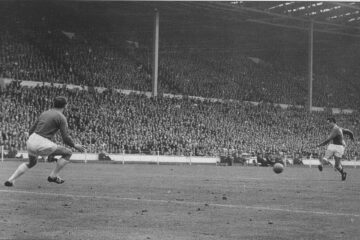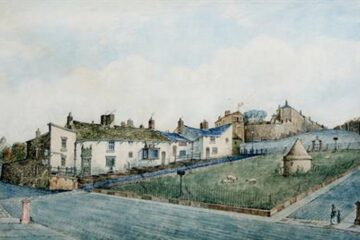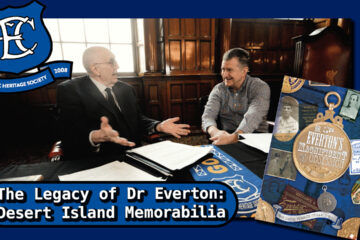When the Scottish FA Cup was inaugurated in 1874, Glasgow based Queens Park won it no fewer than six times during the first ten years. Their run of success however, was interrupted for three years running, by a side from the small town of Alexandria. They played under the name of Vale of Leven. This Dunbartonshire town, on 11 April 1869, was the birthplace of James McMillan.
Born to George, a dye works labourer, and his wife Martha at Bryson’s Land, in the parish of Bonhill, he first arrested the attention of the local football agents while playing for Vale of Leven. The club fought their way through to the 1890 Scottish FA Cup final where McMillan, playing at inside forward, lined up to face Queens Park at Ibrox. The tie, which needed a re-play to decide the outcome, was won by the Glasgow side. Next season, on 12 October, McMillan accepted an offer to sign for Everton. Upon his arrival he was placed, along with four fellow Scottish footballers, under the watchful eye of Mrs Mary Hughes in her home at 45 Chepstow Street. The youngster was first seen playing for Everton in a Combination match, at the home ground of Chester on Tomkinson Street. Around 1,000 people were reported to be lining the ropes to watch the visitors, assisted by two goals from Mc Millan, retire from the field with a 4-0 victory. After the game, a banquet was held at the Boot Inn, where several prominent members of the local community spoke after the cloth had been removed from the table.
When called upon to reply on behalf of the visitors, Dick Molyneux took the opportunity to justify the importation, by Everton, of amateur players from Scotland and paying them for their services. He claimed that ‘a man who plays football should have something granted to him for doing so if he required it. If a man was earning 18 shillings per week and could sign as a professional player and receive emoluments of £2 or £3, then that player was perfectly justified in selling his labour to the highest market’. Molyneux had been in Scotland during the previous few days and had acquired a player who had given an exhibition that afternoon.
Molyneux stated that the Scots spoke a good deal about amateurism in their country but contended that there was no such thing in the Glasgow clubs. If a club was prepared to pay a man for his services, then let them pay him in a legitimate and straightforward manner. He had conversed with several prominent members of the Scottish FA and asked them how was it that a player from small villages, where their parents resided and they were brought up, left these places for other football clubs in Glasgow.
If they retained no remuneration then why had there been a rumpus at the Renton club. It had been brought about by the paying of members, and they could not deny it. He had questioned several prominent members of the Scottish FA, and had not received a satisfactory answer to his mind. With all due respect to the amateur, if a player was prepared to sacrifice his time, his limbs and his life for nothing, then let him do so, but otherwise a man was perfectly justified in receiving payment. (Chester Observer 19 October 1890.)
McMillan had settled in to the Everton Combination side where he quickly formed a left sided partnership with Jack Elliott. He had to wait until 18 March 1893 to make his Football League debut in a 4-2 away victory over Wolverhampton Wanderers. He was to spend just one more season with Everton before returning to Scotland where he signed for the St Bernard’s club in Edinburgh. He had played seven Football League games and scored five goals. His new club competed in the East of Scotland League and played their home matches at Powerhall Stadium. Mc Millan played three seasons here before returning to Liverpool where he married Margaret Shearer and moved in with her family at 21 Newark Street, Walton.
In 1900 Margaret gave birth to twins who they named George and Joan. When the 1911 census was taken the family were living at 89 Bedford Road in Bootle where the head of the household declared his occupation to be that of foreman dock porter. James Mc Millan later became a well-respected member of the North End Scottish Association and worked for the Ellerman and Papayanni Shipping Line. He was still living at 89 Bedford Road when he passed away on 20 February 1937.
The Minster from Everton Valley Presbyterian Church conducted a short service at the house before James’ body was transported to Anfield Cemetery for burial. There was a large crowd of mourners in attendance to hear Pipe-Major McLeod play a pibroch as he led the coffin to its last resting place. Jack Elliott was present to represent Everton Football Club while Joan Gentle, the daughter of James McMillan, was also present.



